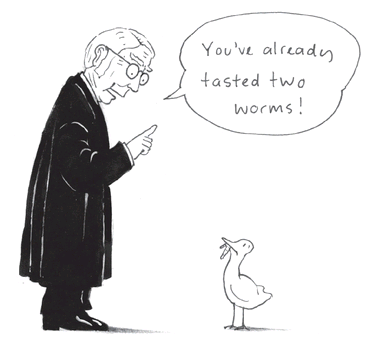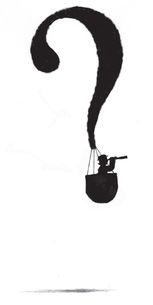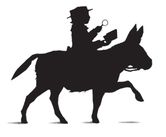The Word Snoop (17 page)
Authors: Ursula Dubosarsky
Dear Snoops,
Names are special things. Most people are
pretty attached to their names. And some
people have more than one name, for quite a
few different reasons . . .
pretty attached to their names. And some
people have more than one name, for quite a
few different reasons . . .
Sometimes, a person’s name even turns
into another word altogether, and becomes
famous
—
more famous than the
person ever was!
into another word altogether, and becomes
famous
—
more famous than the
person ever was!
What am I talking about?
Turn the page to find out . . .
Turn the page to find out . . .
Yours in name (and in deed),
The Word Snoop

9.
Is that a real person?
NicknamesA
nickname is a special name that your friends and family call you. It shows that they know you well, and usually that they like you too. When the Word Snoop was at school, her nickname was
Urk.
(Erk!)
nickname is a special name that your friends and family call you. It shows that they know you well, and usually that they like you too. When the Word Snoop was at school, her nickname was
Urk.
(Erk!)
The word
nickname
comes from the Middle English word
eke,
meaning “to increase,” added to the word
name
(so to “add to a name”). Over time, the words “an
eke
name” said over and over again turned into “a nickname.”
nickname
comes from the Middle English word
eke,
meaning “to increase,” added to the word
name
(so to “add to a name”). Over time, the words “an
eke
name” said over and over again turned into “a nickname.”
Nicknames are actually how a lot of surnames began, as a way of telling one person from another. So a redheaded person in Italy might have been nicknamed
Rosso,
which means “red” in Italian, and this turned into the surname “Rossi.” Or a person in England who was always tired might have been nicknamed
Go to Bed,
which turned into the surname Gotobed. (Come on, Mr. Gotobed, just go to bed!) Back before the Middle Ages, your own surname might have started as a nickname like this.
Rosso,
which means “red” in Italian, and this turned into the surname “Rossi.” Or a person in England who was always tired might have been nicknamed
Go to Bed,
which turned into the surname Gotobed. (Come on, Mr. Gotobed, just go to bed!) Back before the Middle Ages, your own surname might have started as a nickname like this.
Nowadays nicknames are often a shortening of part of a person’s first name or surname, like
Dan
for
Dan
iel, or
Liz
for E
liz
abeth, or
Joe
for
Joseph,
or
Fito
for Adol
fito
(which is already a nickname for Adolfo). Sometimes the name changes a little, like James becomes
Jim
, and William
Bill,
or Katherine
Katie.
Dan
for
Dan
iel, or
Liz
for E
liz
abeth, or
Joe
for
Joseph,
or
Fito
for Adol
fito
(which is already a nickname for Adolfo). Sometimes the name changes a little, like James becomes
Jim
, and William
Bill,
or Katherine
Katie.
Different languages have their own ways of making nicknames—in Taiwan, for example, children’s nicknames are often made by repeating the first syllable of their name, so
Bozhi
turns into
Bobo.
In Spanish-speaking countries, often a person with green eyes will be nicknamed
Gato,
which means “cat.” Do you know some other ways of making up nicknames?
Bozhi
turns into
Bobo.
In Spanish-speaking countries, often a person with green eyes will be nicknamed
Gato,
which means “cat.” Do you know some other ways of making up nicknames?
Nicknames can also be kinds of jokes. In English, there’s a tradition of giving someone a name that means the opposite of what they look like, so a bald man might be called
Curly
, or a tall person
Tiny.
This goes back a long way, and is almost a kind of euphemism. Remember
Little John,
one of Robin Hood’s merry men in Sherwood Forest, who was actually really big?
Curly
, or a tall person
Tiny.
This goes back a long way, and is almost a kind of euphemism. Remember
Little John,
one of Robin Hood’s merry men in Sherwood Forest, who was actually really big?
Other joke nicknames might come from what a person does for a living, like a butcher might be called
Chops,
or an electrician
Sparky
. And can you work out why Mr. White is called
Chalky,
or Mrs. Fowler
Chick
?
Chops,
or an electrician
Sparky
. And can you work out why Mr. White is called
Chalky,
or Mrs. Fowler
Chick
?
Nicknames are everywhere—for politicians, for sports teams, even for buildings and countries. I’m sure you can think of many of these. (The Word Snoop is always happy to say she lives in the land of
Oz
!) You will have also used nicknames on the Internet, which are usually known as
handles
or
user names.
Oz
!) You will have also used nicknames on the Internet, which are usually known as
handles
or
user names.
Finally, there are the nicknames that tend to stick even if nobody remembers how they started or where they came from. The brilliant Brazilian football player Edson Arantes Do Nascimento, known all over the world by his nickname
Pelé,
does not know himself where the nickname began! This often happens in families when children are small. These can be the best sorts of nicknames—where they really belong to the person and make them feel loved. I wonder if you have some nicknames like that in your own family?
EponymsPelé,
does not know himself where the nickname began! This often happens in families when children are small. These can be the best sorts of nicknames—where they really belong to the person and make them feel loved. I wonder if you have some nicknames like that in your own family?
Know any good eponyms? No? Let’s put it another way. Ever heard of
sideburns,salmonella,
or
sandwiches
? Ever been
mesmerized
or
mentored
? Do you know if
hooligans
have good
hygiene
?
sideburns,salmonella,
or
sandwiches
? Ever been
mesmerized
or
mentored
? Do you know if
hooligans
have good
hygiene
?
What is the Word Snoop talking about?
All of these words are eponyms. An eponym is a word that comes from a person’s name.
Epi
in Greek means “upon,” and
onoma
means “name.”
Epi
in Greek means “upon,” and
onoma
means “name.”
So all those words in italics came from names of either real or invented people, who said or did something memorable that meant something was named after them. Can you imagine the sort of hair the U.S. general Ambrose Everett
Burnside
had on his face? Or the disease Daniel
Salmon
was interested in? Or the Earl of
Sandwich
’s favorite food?
Burnside
had on his face? Or the disease Daniel
Salmon
was interested in? Or the Earl of
Sandwich
’s favorite food?
These are just a few eponyms, and you would know many more. Often it’s just a matter of looking them up in a dictionary or on the Internet and finding the etymology of the word (which would tell you where the word originally came from). There are hundreds, probably thousands of eponyms in English, for all sorts of reasons. I wonder if you could find out where the names
Ferris
wheel came from, or
bloomers
, or
Granny Smith
apples (yum!), just to name a few.
Ferris
wheel came from, or
bloomers
, or
Granny Smith
apples (yum!), just to name a few.
It would be a strange thing, wouldn’t it, to wake up in the morning and discover that something had been named after you? Hmm, in your case, I wonder what that would be? Or what you would
like
it to be?
like
it to be?
As for me, I’d like to go to a restaurant and order myself a triple-chocolate-caramel-fudge-super-special
Word Snoop . . .
Word Snoop . . .

FRANZ MESMER
SpoonerismsParty time! Would you like a
b
elly
j
ean? No? What about a
ch
ag of
b
ips? What on earth am I talking about? I’m playing a kind of word game called spoonerisms. Over 100 years ago at Oxford University in England, there was a man called the Reverend William Archibald Spooner. He was a gentle, white-haired history teacher, but that’s not what he was famous for—it was the way he spoke that made everyone remember him.
b
elly
j
ean? No? What about a
ch
ag of
b
ips? What on earth am I talking about? I’m playing a kind of word game called spoonerisms. Over 100 years ago at Oxford University in England, there was a man called the Reverend William Archibald Spooner. He was a gentle, white-haired history teacher, but that’s not what he was famous for—it was the way he spoke that made everyone remember him.
Reverend Spooner had a funny habit of switching around the first letters of words near each other, which made them sound like different words altogether. So instead of saying “toe nails,” for example, he might have said “
n
o
t
ails,” instead of “blow your nose,” he said “
kn
ow your
bl
ose.” These are what we now call spoonerisms, after Reverend Spooner. (Aha! That’s another eponym.)
n
o
t
ails,” instead of “blow your nose,” he said “
kn
ow your
bl
ose.” These are what we now call spoonerisms, after Reverend Spooner. (Aha! That’s another eponym.)
Imagine if you had been one of Reverend Spooner’s students, and he met you in the corridor. Can you work out what he’s saying on the opposite page?
Student:
Good morning, Reverend
Spooner. How are you today?
Good morning, Reverend
Spooner. How are you today?
Reverend Spooner:
Wite quell, thank
you. Dot are you wooing?
Wite quell, thank
you. Dot are you wooing?
Student:
Er, I’ve been playing football.
Er, I’ve been playing football.
Reverend Spooner:
Football! But you
have hissed my mystery lecture!
Football! But you
have hissed my mystery lecture!
Student:
Oops.
Oops.
Reverend Spooner:
This is go nood.
You’ve already tasted two worms playing
football. Go and shake a tower and come
straight to my office.
This is go nood.
You’ve already tasted two worms playing
football. Go and shake a tower and come
straight to my office.
Student:
Ses yer! I mean, yes sir.
Ses yer! I mean, yes sir.

Some people, like Reverend Spooner, can’t help talking in spoonerisms, but that’s very rare. Most of the time, writers and comedians make them up, for the fun of playing with words. I wonder if you can work out the spoonerisms on the next page? Better still, make up some really funny ones of your own!
Spoonerisms
1.
It’s roaring pain outside.
It’s roaring pain outside.
2.
That’s a lack of pies!
That’s a lack of pies!
3.
Would you like a soul of ballad?
Would you like a soul of ballad?
4.
I don’t have time to chew my doors.
I don’t have time to chew my doors.
5.
Do you live on this hock of blouses?
Do you live on this hock of blouses?
6.
Eye ball!
Eye ball!


You’ve heard of a cookie factory or an ice-cream factory, but imagine a writing factory! Rows and rows of writers hunched over desks writing story after story, trying to think up new plots and characters every day.
About 70 years ago in the United States, the E. L. Stratemeyer writing factory produced a popular series of children’s adventure books about a boy genius inventor named Tom Swift. They had titles like
Tom Swift and His Sky Racer, Tom Swift and His Wizard Camera,
and
Tom Swift and His Giant Magnet.
These hardworking writers were teased for all the different words they used whenever Tom Swift said anything—Tom Swift didn’t just say things, he
declared,
he
murmured,
he
whispered,
he
giggled,
he
stammered,
he
snorted,
he
sneered . . .
you get the idea!
Tom Swift and His Sky Racer, Tom Swift and His Wizard Camera,
and
Tom Swift and His Giant Magnet.
These hardworking writers were teased for all the different words they used whenever Tom Swift said anything—Tom Swift didn’t just say things, he
declared,
he
murmured,
he
whispered,
he
giggled,
he
stammered,
he
snorted,
he
sneered . . .
you get the idea!
Other books
Revenant by Larissa Ione
Seduced by the Boss 3: For Her Pleasure by Jenn Roseton
Issola by Steven Brust
Interspecies: Lustful Alpha Beast Erotica (Selection Book 1) by Jezebel Rose
Time and the Riddle: Thirty-One Zen Stories by Howard Fast
Their Virgin Slayer (Devils Among Us) by London, Darby
03 Solar Flare - Spark Series by Autumn Dawn
Ravi the Unknown Prince by Rookmin Cassim
Temptations of Anna Jacobs by Robyn DeHart
82 Desire by Smith, Julie